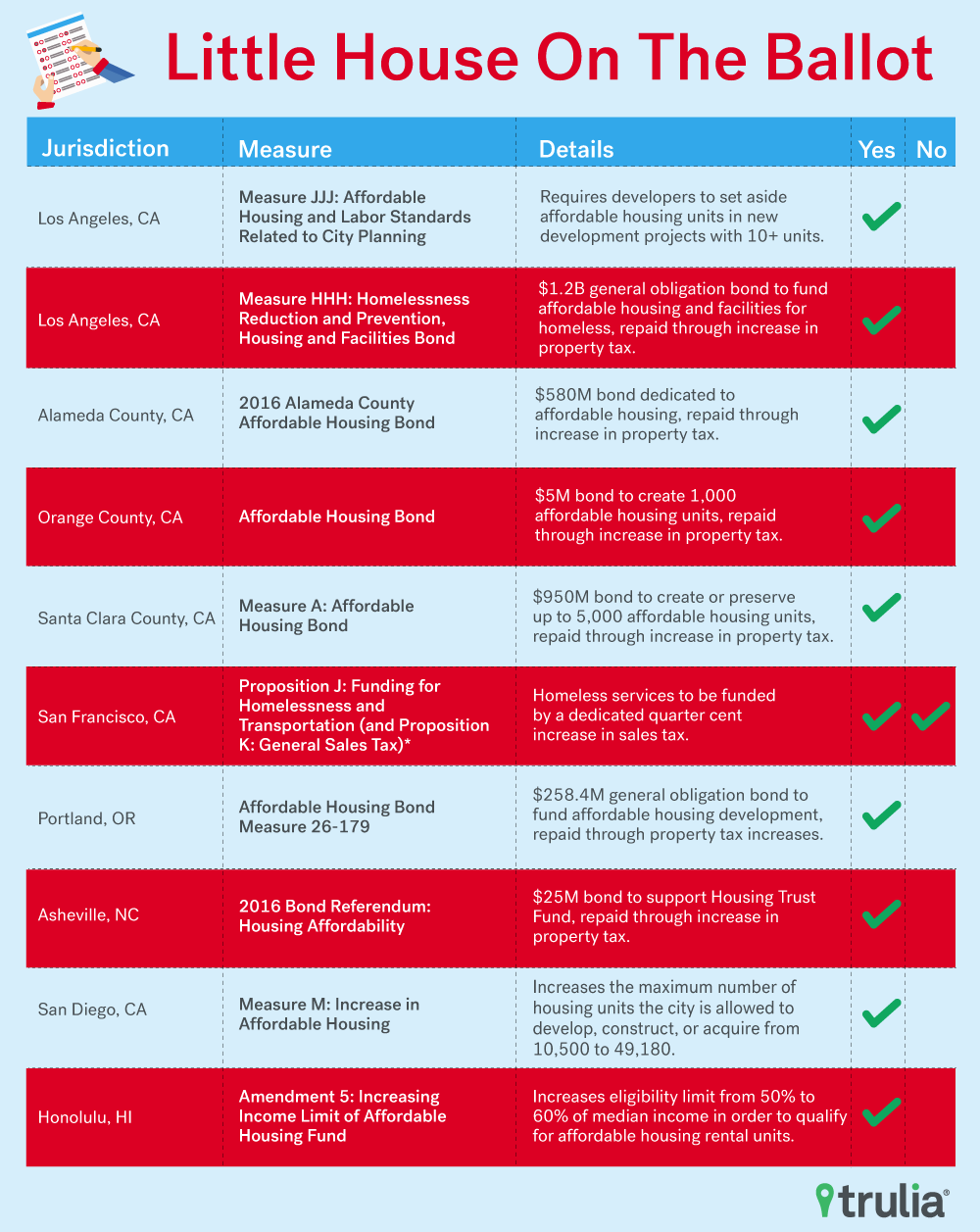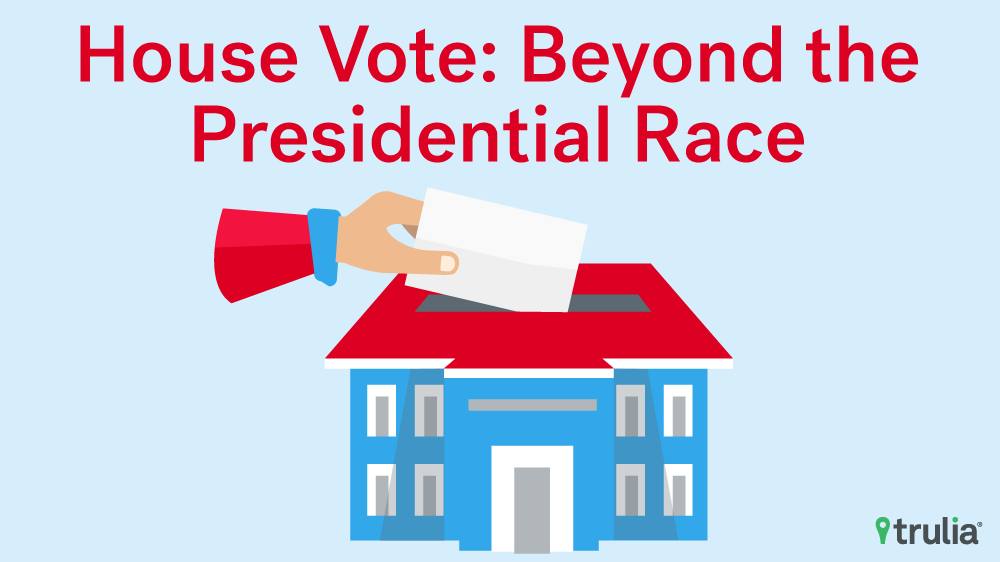While much of the attention Wednesday is understandably focused on the surprising results in the presidential race, voters in housing-starved cities decided on multiple ballot measures seeking to determine the government and taxpayers’ role in providing ample, affordable housing.
In cities including Los Angeles, Portland, Orange County, Calif., and Asheville, N.C., voters mostly agreed to new taxes, bond issues or zoning changes that would require developers to add affordable housing units as part of any new plans. In notoriously pricey San Francisco, the vote was mixed with voters approving measures to aid the homeless and increasing affordable housing, but balking on a proposal to create a new housing commission as well as requiring a minimum number of competitive bids for affordable housing developments (we previewed many of these measures last week).
Rent control and stabilization measures results in California, however, were a mixed bag. The cities of Mountain View, Richmond and Alameda passed measures to keep rent increases in check, but similar measures in Burlingame and San Mateo were defeated. These results illustrate the division in the how the public perceives rent control measures and questions around its enforcement as a tool to keep housing affordable.
Overall, measures that sought to reduce the scarcity of affordable housing performed well. The importance of these housing issues in these markets is underscored by the fact that California voters had to wade through a hefty ballot consisting of 17 state propositions, and an additional 25 local measures in San Francisco.

Note: Proposition J in San Francisco passed and Prop K which would fund Prop J failed.
Local Funding Measures
Bond measures to create or maintain affordable housing passed with resounding success with voters prioritizing tax dollars to fund housing and homelessness programs.
| Jurisdiction | Measure | Details | Result |
| Los Angeles | Measure HHH: Homelessness Reduction and Prevention, Housing and Facilities Bond | $1.2B general obligation bond to fund affordable housing and facilities for homeless, repaid through increase in property tax. | YES |
| San Francisco | Proposition C: Affordable Housing Bond Issue | Transfers unused funds from the 1992 seismic bond to be used for Affordable Housing Loan Program. | YES |
| San Francisco | Proposition J: Funding for Homelessness and Transportation (and Proposition K: General Sales Tax) | Homeless services to be funded by a dedicated quarter cent increase in sales tax. | YES/NO |
| Alameda County[1] | 2016 Alameda County Affordable Housing Bond | $580M bond dedicated to affordable housing repaid through increase in property tax. | YES |
| Orange County | Affordable Housing Bond | $5M bond to create 1,000 affordable housing units repaid through increase in property tax. | YES |
| Santa Clara County[2] | Measure A: Affordable Housing Bond | $950M bond to construct up to 5,000 affordable units repaid through increase in property tax. | Too close to call. |
| Portland, OR | Affordable Housing Bond Measure 26-179 | $258.4M general obligation bonds to fund affordable housing development repaid through increase in property tax. | YES |
| Asheville, NC | 2016 Bond Referendum: Housing Affordability | $25M bond to support Housing Trust Fund repaid through increase in property tax. | YES |
[1] Includes Oakland, CA metropolitan area.
[2] Includes San Jose, CA metropolitan area.
Inclusionary Housing Measures
Measures to change income eligibility for affordable housing were mixed, but the passage of Los Angeles’ Measure JJJ ensures that certain new developments will include affordable housing units.
| Jurisdiction | Measure | Details | Result |
| Los Angeles | Measure JJJ: Affordable Housing and Labor Standards Related to City Planning | Requires set aside affordable housing units in new development projects with 10+ units. | YES |
| San Francisco | Proposition U: Increased Income Qualifications for Affordable Housing | Increases the income eligibility from 55% of area median income to 110% under the City’s inclusionary housing program. | NO |
| Honolulu | Amendment 5: Increasing Income Limit of Affordable Housing Fund | Increases affordable income limit on Affordable Housing Fund rental housing to 60% of area median income, up from 50%. | YES |
Planning, Zoning, Land Use Measures
| Jurisdiction | Measure | Details | Result |
| Encinitas, CA | Measure T: Compliance with State Housing Law | Updates the City’s Housing Element in an effort to incentivize housing affordability. | NO |
| San Diego | Measure M: Increase in Affordable Housing | Increases the maximum number of housing units the City is allowed to develop, construct, or acquire from 10,500 to 49,180. | YES |
| San Francisco | Proposition M: Housing and Development Commission Establishment Amendment | Amends City Charter to create a new Housing and Development Commission, moving it out from under the Mayor’s Office. | NO |
| San Francisco | Proposition P: Minimum Three Proposal Requirement for Affordable Housing Projects on City Property | Affordable housing projects built on city land would require a minimum of three bids in order to move forward. | NO |
| Sonoma County, CA | Protection for “Community Separators” | Maintains provision to protect 17,000 acres of open space, but constrains supply of developable land. | YES |


